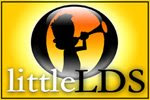So, after weighing my options over the weekend, I carefully narrowed down my list of ideas, and have decided that my first S.O.P. (Succeed On Purpose) project ought to be children’s books. Of all my ideas, this seems to be the one that I have the most control over. Control, in this case, translates into a higher probability of success simply because there are fewer outside factors to inhibit me. I’m only dealing with my time, my talent, my motivation. I’ve always enjoyed writing, and illustrating comes naturally to me. I’ve already written several things that will all go into this project.
Happy with my new focus, I told my wife on Friday night about my S.O.P. strategy. She thought it was good too, until she heard which of my ideas I had settled on to start with. She’s never shared my vision for this one, and that’s okay. Don’t get me wrong, she thinks I’m a good writer and artist, but she thinks the particular project I’ve decided on isn’t the most promising. Let me explain.
As a big ‘Rich Dad Poor Dad’ fan, I realized some years ago that there is a virtually un-tapped market out there waiting for someone to dive into. It’s the rich (or soon-to-be rich) kids, the smart kids, and kids with proactive parents and anyone else who just wants to start educating…well, sooner. I believe kids are much smarter and capable than we give them credit for. I think kids now days are brighter, and that their general learning curves are shorter than ever before. I think they’re capable of learning things earlier than we actively teach them. Robert Kiyosaki’s “Rich Dad” started teaching him as a young boy to be financially literate. He started early and on purpose, and he kept things simple at first. The resulting foundation that was built was sturdy and has far exceeded mere endurance.
Accordingly, my idea is to create a series of books based on the principles and concepts that we, sponges of information, don’t typically learn until a little later on. I think many things are not learned earlier simply because they’re not taught any earlier. But kids pick up on much more of what they’re exposed to than just what they’re actually taught. For instance, how many kids sense marital tensions between their parents and figure out there’s a problem? How many parents discover that the “code” they’ve been using (be it Pig-Latin, sign or just spelling things out) to keep their kids in the dark hasn’t worked for months, and all of a sudden, Junior knows there’s no Easter Bunny? My own six-year-old, who hasn’t even started 1st grade yet, is already sending me text messages on my wife’s phone and building a miniature empire in the online world of Webkins for heaven’s sake!
I told "K" that my idea is to create these books to introduce young kids to principles (which they will eventually learn anyway) through rhymes and fables. Will they understand the principles immediately when reading the rhymes and fables? Not likely. Does that even matter? Not at all. How many kids understand the lesson behind “Oh, The places you’ll go” by Dr. Seuss? The POINT is to entertain them, like any other book. If the underlying message is perceived at all, it’ll be merely to introduce them to the principles…perhaps only via osmosis. I’ve always believed that when it comes to children’s books, you sell the words to the parents and you sell the illustrations to the kids. Eventually, though, the words will sink in. Entertain them now with illustrations and clever rhymes and perhaps someday, while in an elementary or middle school class learning about some fundamental principle, they just might look BACK at these childhood stories and say something like, “Oh, hey, this is just like the story of the….” The trick here is to keep things simple, and not to give in to the temptation to over explain or complicate. Teach just the principles.
The types of books "K" would like to see me writing and illustrating are the kind of books that have withstood the test of time and sales. They’re the type that focus more on morals, values, attributes, and personal character. While I can appreciate her perspective as a mother and consumer, and certainly her sense of “what already works and sells”, I also feel like that defeats my whole novel idea; the idea that kids are capable of handling more complex principles. Both of these perspectives are useful, but only one is novel. Anyone can write about the ABC’s or the 123’s. Anyone can write about opposites or colors. Anyone can create characters and wrap them in a cute story that teaches bravery, honesty or helpfulness. But that’s been done…over and over and over again. I want to tackle the challenge of simplifying general priciples for KIDS! Not everyone can do that.
In the end, I think there’s a very good chance that "K" will be right. I think my idea will be a tough sell. But, it’ll either sell or it won’t. Those are the only two outcomes. I’ll never know if I don’t try, and I’ll always regret it if I opt to conform. I like the idea, so I’m going to go for it. This project will be much more interesting to me than writing something that will ultimately become camouflaged in the sea of conventional children’s books.
Subscribe to:
Post Comments (Atom)











No comments:
Post a Comment